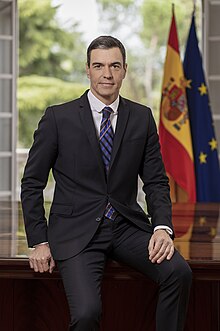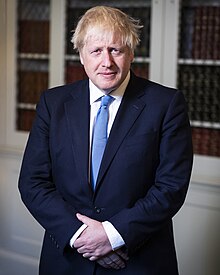2020s in European history
Issues such as immigration, economic policies (especially concerning with inflation), the invasion of Ukraine and its impacts played significant roles in shaping European political agendas.She served as a deputy leader of the CDU from 2010 to 2019, and was regarded as a leading contender to succeed Merkel as the chancellor of Germany and as the favourite to become the secretary general of NATO after Jens Stoltenberg.[27] Alexander Grigoryevich Lukashenko[b] (also transliterated as Alyaksandr Ryhoravich Lukashenka;[c] born 30 August 1954) is a Belarusian politician who has been the first and only president of Belarus since the office's establishment in 1994,[29] making him the current longest-serving European leader.[49] In the 2023 Czech presidential election, retired general Petr Pavel defeated former prime minister and businessman Andrej Babiš with over 58% of the popular vote in the second round.[60] In the 2023 Estonian parliamentary election incumbent Prime Minister Kaja Kallas' center-right Reform Party was the clear winner with 31.2% of the vote and 37 seats in the Riigikogu.[71] The French government demanded that the representative body for the religion in the country accept a 'charter of republican values', rejecting political Islam and foreign interference, as well as establishing a system of official licenses for imams.[93][94] In terms of geographical distribution, the SPD made the most consequential gains in eastern Germany in addition to increasing their vote share in their traditional heartlands in the Rhineland and the northwest.[152] During the 2022 Italian government crisis on 14 July, despite having largely won the confidence vote, Prime Minister Draghi offered his resignation, which was rejected by President Sergio Mattarella.[160] The 2022 Italian presidential election was held in between 24 and 29 January 2022 and culminated in incumbent president Sergio Mattarella being confirmed for a second term, with a total of 759 votes out of 1009 on the eighth ballot.[162] The 2022 Italian general election, which saw record-low voter turnout, was won by the centre-right coalition, headed by the Brothers of Italy party with their leader Giorgia Meloni.[185] Triggered by the Government of Kosovo's decision to reciprocally ban Serbian license plates, a series of protests by Serbs in North Kosovo—consisting mostly of blocking traffic near border crossings— began on 20 September 2021.On 31 August, the leaders of three opposition coalitions, For the Future of Montenegro, Peace is Our Nation and In Black and White, agreed to form an expert government, and to continue to work on the European Union accession process.During Putin's initial presidential tenure, the Russian economy grew on average by seven percent per year,[241] driven by economic reforms and a fivefold increase in the price of oil and gas.He also ordered a military intervention in Syria to support his ally Bashar al-Assad during the Syrian civil war, with the aim of obtaining naval bases in the Eastern Mediterranean.[290] Among other causes, the protests were driven by the crisis of democratic institutions under Aleksandar Vučić's rule and the growing concern that the President is concentrating all powers in his hands at the expense of the parliament.[306] After two general elections, in January 2020 Sánchez reached an agreement with the far-left Unidas Podemos electoral alliance,[307] forming Spain's first coalition government since the Second Republic (1931–1939).[311] Sánchez's premiership has been marked by several international events that have harmed Spanish interests, such as the COVID-19 pandemic, the fall of Kabul, the Russian invasion of Ukraine, the political instability in Latin America and the conflict between Hamas and Israel, among others.Born to a Ukrainian Jewish family, Zelenskyy grew up as a native Russian speaker in Kryvyi Rih, a major city of Dnipropetrovsk Oblast in central Ukraine.Zelenskyy announced his candidacy in the 2019 presidential election on the evening of 31 December 2018, alongside the New Year's Eve address of then-president Petro Poroshenko on the TV channel 1+1.During the first two years of his administration, Zelenskyy oversaw the lifting of legal immunity for members of parliament (the Verkhovna Rada),[350] the country's response to the COVID-19 pandemic and subsequent economic recession, and some limited progress in tackling corruption in Ukraine.[358] When Russia launched its full-scale invasion, Zelenskyy remained in Kyiv, declining international offers to evacuate him from the capital under attack; he declared martial law across Ukraine and a general mobilisation of the armed forces.[370] Under Boris Johnson's government, the UK left the EU on 31 January 2020; trade deal negotiations continued to within days of the scheduled end of the transition period on 31 December 2020 CET.These, combined with impacts on electoral performance, led to the ruling Conservative Party holding a vote of confidence in Johnson's leadership in June 2022, which he won, although he was politically weakened.Truss resigned as leader of the Conservative Party on 20 October 2022, which would make her the shortest-serving prime minister in British history following the September mini-budget, which was received negatively by the world financial markets.Boris Johnson's tenure as Prime Minister of the United Kingdom began on 24 July 2019 when he accepted an invitation of Queen Elizabeth II to form a government, succeeding Theresa May, and ended on 6 September 2022 upon his resignation.After agreeing to a revised Brexit withdrawal agreement but failing to win parliamentary support, Johnson called a snap general election to be held in December 2019, which the Conservative Party won.[385] In the Partygate scandal it was found that numerous parties had been held at 10 Downing Street during national COVID-19 lockdowns, and COVID-19 social distancing laws were breached by 83 individuals, including Johnson, who in April 2022 was issued with a fixed penalty notice.Rishi Sunak's tenure as Prime Minister of the United Kingdom began on 25 October 2022 when he accepted an invitation from King Charles III to form a government, succeeding Liz Truss, and ended on 5 July 2024 upon his resignation.In 2023, Sunak outlined five key priorities: halving inflation, growing the economy, cutting debt, reducing NHS waiting lists, and stopping the illegal small-boat crossings of the English Channel (by enacting the Rwanda asylum plan).Keir Starmer's tenure as Prime Minister of the United Kingdom began on 5 July 2024 when he accepted an invitation from King Charles III to form a government, succeeding Rishi Sunak of the Conservative Party.





















2020s in historyelectionsCovid-19inflationinvasion of UkraineNetherlandsSlovakiaPresident of the European UnionUrsula von der LeyenUrsula Gertrud von der Leyenpresident of the European CommissionGerman federal governmentAngela MerkelFederal Minister of DefenceChristian Democratic UnionEuropean political partyEuropean People's PartySpitzenkandidatEuropean ParliamentBrusselsErnst AlbrechtEuropean civil servantsHeiko von der LeyenHanover regionLower SaxonyMinister for Family Affairs and YouthMinister for Labour and Social Affairschancellor of Germanysecretary general of NATOJens StoltenbergMichael FallonEuropean CouncilEuropean CommissionInternational Criminal Tribunal for the Russian Federationmost powerful woman in the worldForbesmembers of the European ParliamentThe GreensAustrian People's PartyFederal ChancellorSebastian KurzFederal Ministry of FinanceembezzlementbriberyAlexander Schallenberg2022 Austrian presidential electionVan der BellenFreedom Party of AustriaWalter Rosenkranz2020 Belarusian protests2020 Belarusian presidential electionAlexander LukashenkoSviatlana TsikhanouskayaCoordination Councilrefused to accept the result of the electionEuropean UnionAlexander Grigoryevich Lukashenkopresident of Belaruscurrent longest-serving European leadersovkhozSoviet Border TroopsSoviet ArmySupreme Soviet of the Byelorussian Soviet Socialist Republicdissolution of the Soviet UnionSupreme Council of Belarusinaugural presidential electionconstitutioneconomic shock therapystate ownershippost-Soviet statesEastern BlocoligarchySoviet-era symbolismRussian languagecoat of armsnational flag1995 referendumreferendum in 1996authoritariangovernmentInternational monitorsBelarusian electionsfree and fairlimits media freedomsanctions on Lukashenko and other Belarusian officials2020 presidential electionvote-rigginganti-government protestsRussiadisagreements related to tradeVladimir PutinBoris YeltsinUnion State of Russia and BelarusWagner Group rebellionRyanair Flight 4978Roman Protasevichban Belarusian carriers from flying into EU airspace2021 crisis2021 Belarus–European Union border crisismigrant crisisLithuaniaLatviaPolandBelarusBelarus–European Union relations2020–2021 Belarusian protestsattempted repatriation ofKrystsina Tsimanouskayahybrid warfarehuman trafficking2020–2021 Bulgarian protestsBulgariaBulgarian diasporaMadridBarcelonaBerlinLondonstate captureBoyko BorisovSnap parliamentary electionsApril 2021 electionsThere Is Such a PeopleSlavi TrifonovUnion of Democratic Forces2022 Bulgarian parliamentary electionWe Continue the Change
